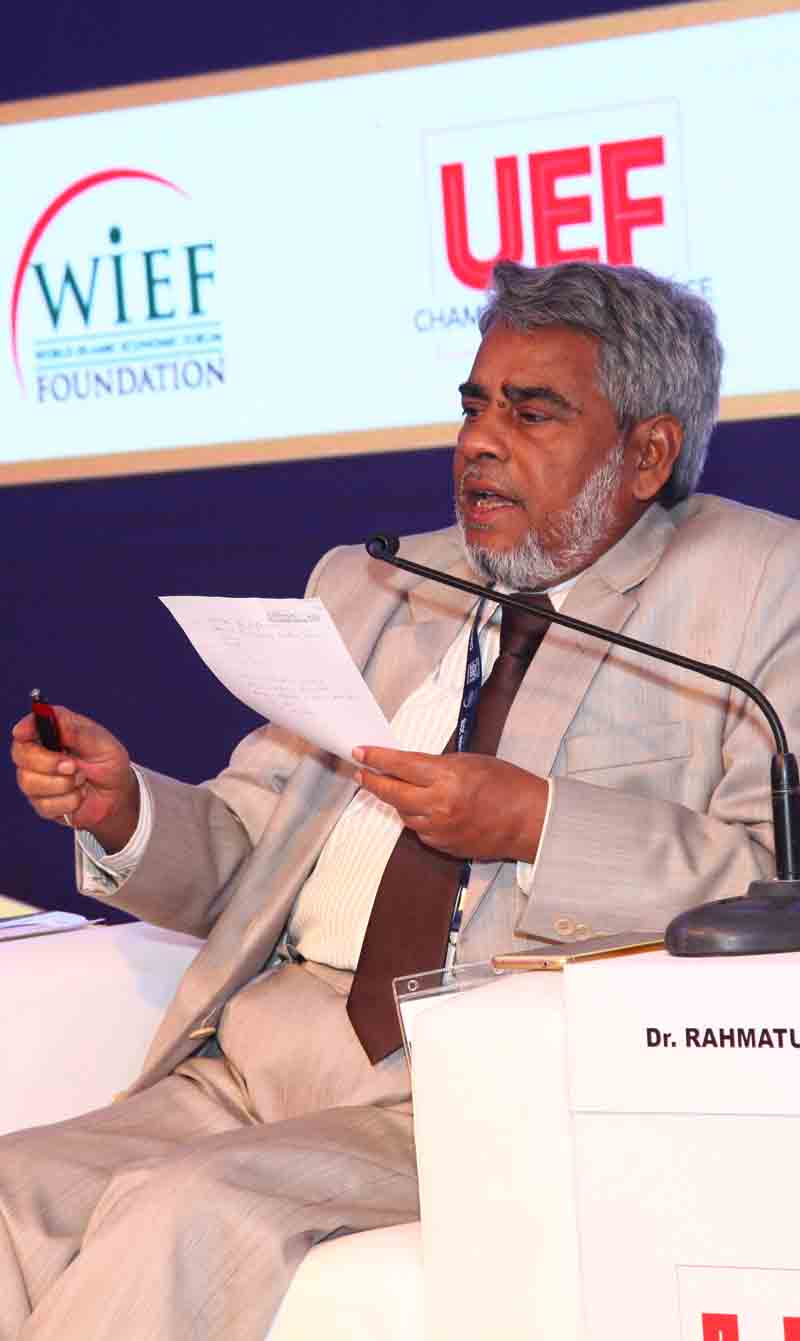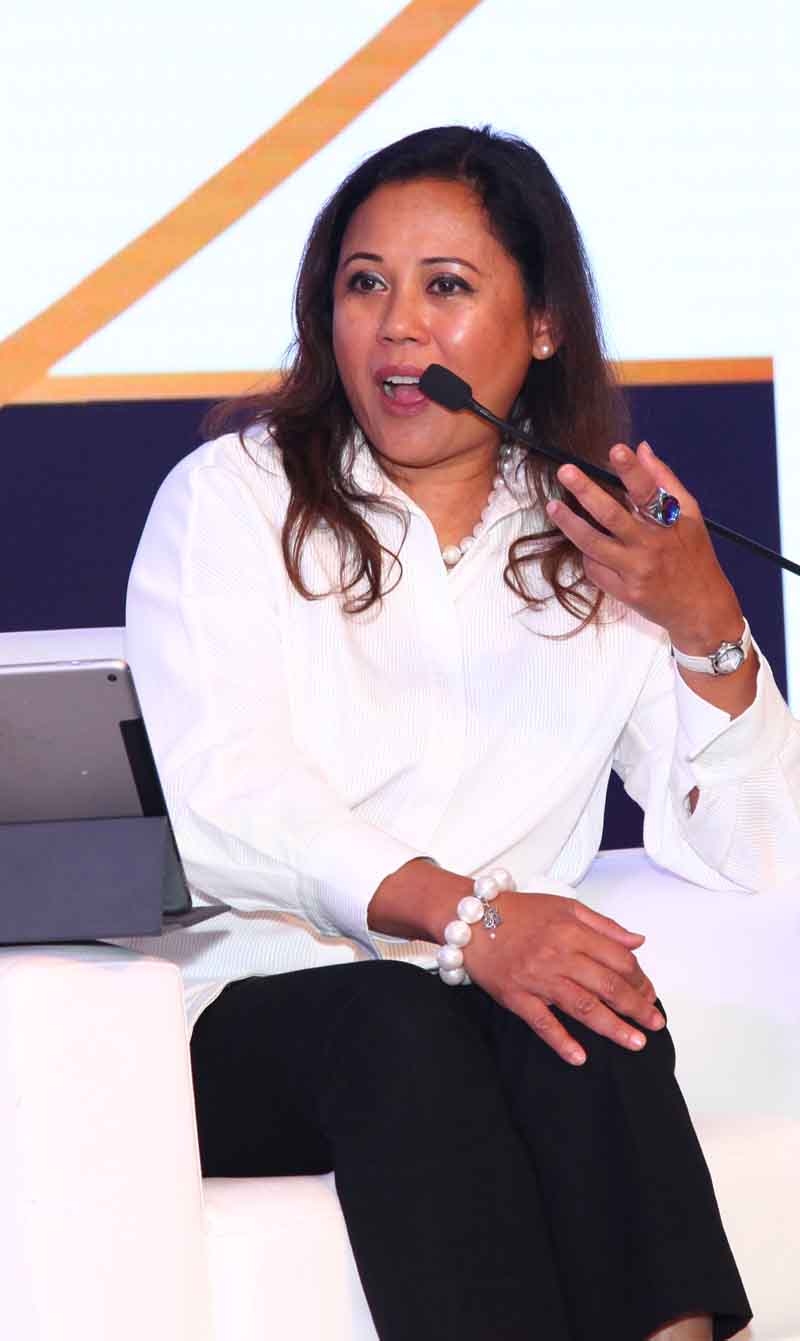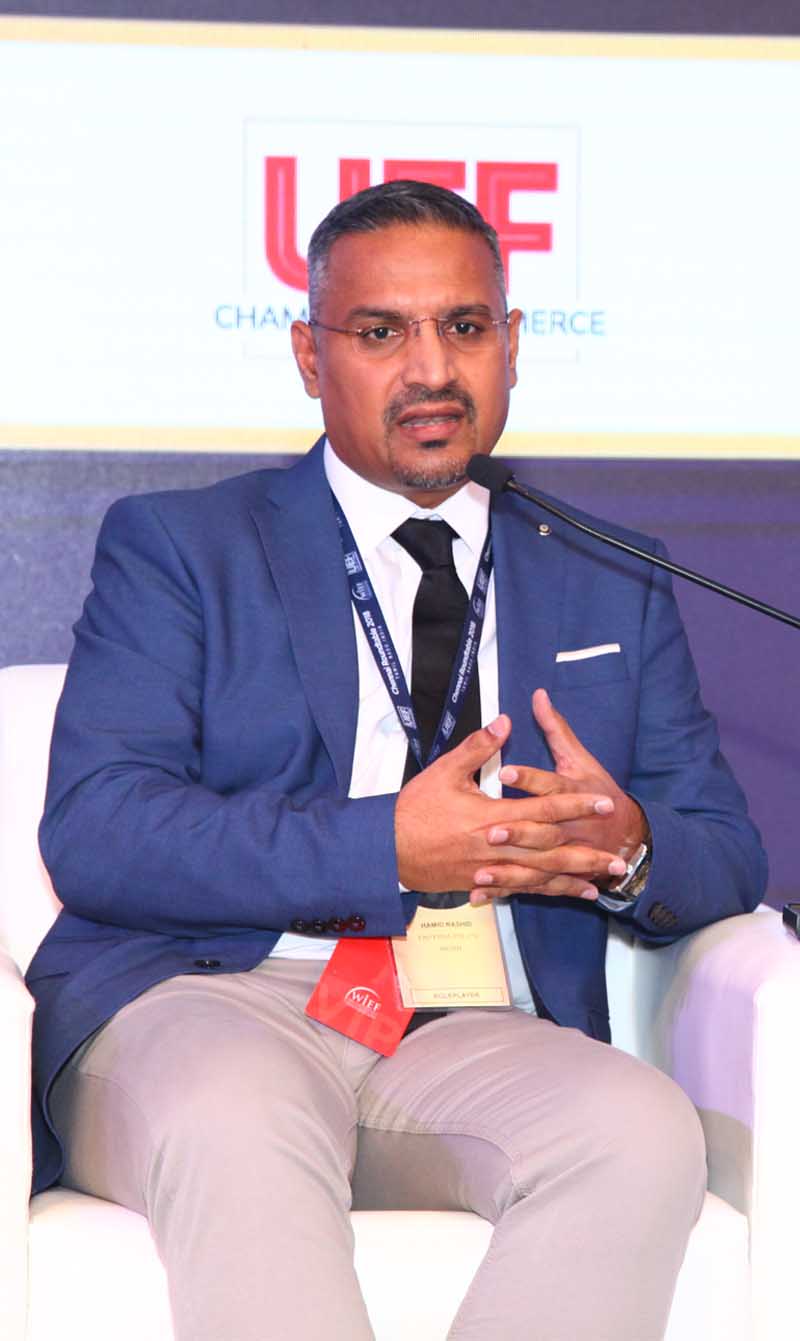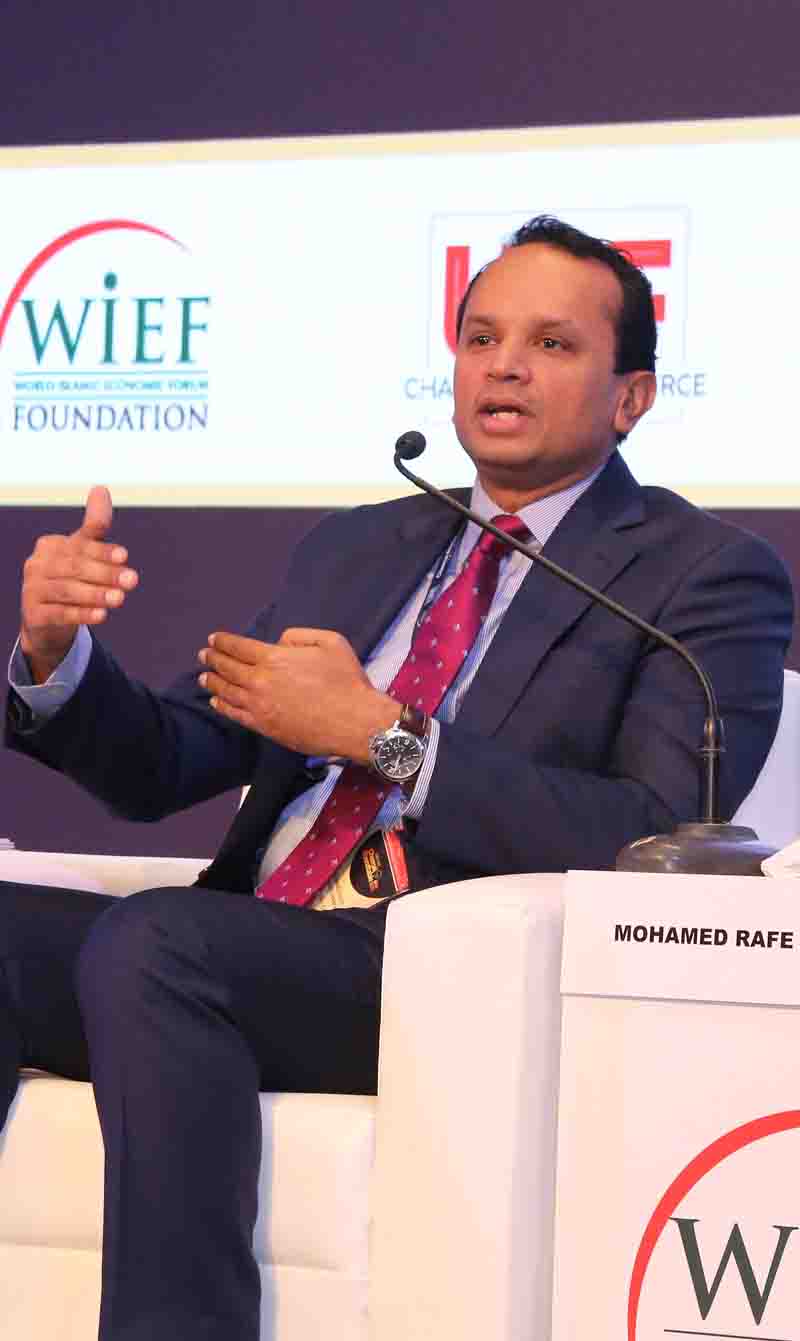Dialogue on sukuk
The sukuk market has expanded substantially in the past decade—total sukuk issuance grew from USD5 billion in 2003 to USD134 billion in 2012. Nonetheless, the impressive growth of sukuk must be tempered with caution to ensure its consistent adherence to the ethical and legal principles of Islamic economics. This topic was discussed at the 10th WIEF in Dubai.
In a discussion at the 10th WIEF in Dubai, speakers explored what steps should be taken to develop a sound regulatory framework for sukuk while simultaneously spreading sukuk offerings in the global financial market. The discussion was preceded by four special addresses delivered by prominent government officials from Malaysia, Kazakhstan, the UK and the UAE, who shared their respective country’s experiences in developing sukuk and the Islamic capital market. The session was then followed by a dialogue to examine a broader range of topics, including sukuk financing in infrastructure development; improvement of related organisations, processes and product standardisation in sukuk; and the link between the Islamic financial industry and macroeconomic management. It was moderated by Mushtak Parker, Editor of Islamic Banker and owner of Mushtak Parker Associates Ltd in UK.
Dubai’s milestones in the sukuk market
H.E. Essa Kazim, Governor of Dubai International Financial Centre, spoke about how the UAE had stepped up its efforts in the Islamic financial sector in line with its vision of Dubai as the capital of the Islamic economy. Dubai has earned its position as the third global centre for sukuk, following the recent listing of sukuk worth USD750 million by the Dubai government as well as the listing of USD1 billion by the Government of the Hong Kong Special Administrative Region of the People’s Republic of China on Nasdaq Dubai.
The year 2014 was described by Essa as being a ‘watershed year for sovereign sukuk’. It is expected that sovereign sukuk issuance will exceed 2013 levels to reach around USD30 billion by the end of 2014 with the overall outstanding amount set to reach USD115 billion. Continued expansion in the number of sukuk- issuing governments through 2015 is also expected. ‘It is estimated that the sukuk market is likely to sustain double digit growth in the next three years with assets in Islamic finance expected to reach USD2.8 trillion by 2015,’ he said.
This bodes well for Dubai as the growth of the city’s Islamic finance sector is led by the sukuk market. ‘Looking ahead, we can safely say that Dubai is well poised to become the capital of the Islamic economy,’ he said.
Potential of the global sukuk market
In her address, Dr Zeti Akhtar Aziz, the 7th Governor of the Central Bank of Malaysia, described
the accelerated development
of the global sukuk market as having reached ‘USD270 billion outstanding, and is evolving to become a distinct platform for fostering greater international economic and financial linkages.’
The sukuk market has drawn increasing interest from sovereign funds, multilateral institutions as well as multinational and national corporations—from both developed and emerging economies—towards financial investments in a wide range of economic activities and development projects. The geographical reach of the sukuk market has also become more extensive with global sukuk outstanding now being domiciled in more than 20 countries with an investor base spanning Asia, the Middle East and Europe. In Asia, it is estimated that a funding of USD8.3 trillion is required until 2020 for infrastructure projects, while the funding requirements in the Middle East are estimated to be USD2 trillion over the same period.
‘The success of the sukuk market reflects its ability to meet the changing and differentiated demands of the modern economy by developing innovative and cutting-edge structures and products as well as by achieving competitive pricing,’ said Dr Zeti. Growth in sukuk can also be credited to increasing efforts by the governments of Muslim countries to advance the Islamic finance market not only to other Islamic sovereign issuers but also non-Islamic ones. ‘Going forward, the sukuk market will become a potentially important source of funding to support new infrastructure and economic development, particularly for emerging and developing economies in Asia, the Middle East and Africa,’ she added.
The Malaysian experience
Dr Zeti went on to describe Malaysia’s experience in the development of its sukuk market, which has taken place against the backdrop of a systematically developed Islamic capital market, a strong legal and shariah framework and a robust financial infrastructure. These concrete initiatives have enabled Malaysia to provide a complete sukuk issuance and trading platform.
‘Since the first sukuk issuance in 1990 by a multinational corporation, the sukuk outstanding in Malaysia’s marketplace is now USD158 billion,’ she said. Spurred by the liberalisation of the marketplace, the sukuk market in Malaysia has been wide ranging and has seen many innovative structures and a greater diversity in the type of sukuk maturity. Taking the Malaysian perspective as a model of growth, Dr Zeti was encouraged by the future of the sukuk market. ‘The dynamism of the sukuk market contributes towards facilitating the expansion of inter-regional investment flows. As we move towards increasing this internationalisation of Islamic finance and thus towards greater global financial integration, it will contribute towards financial stability that will be mutually reinforcing for all of us,’ she said.
Sukuk development in Kazakhstan
Kairat Kelimbetov, Governor of
the National Bank of Kazakhstan shared that there have been
many exciting developments in the Islamic financial industry of Kazakhstan, and these have been supported by government policies, international assistance from the Islamic Financial Services Board, the Islamic Development Bank as well as high investor interest.
According to Kelimbetov, sukuk activity has increased in recent years. State-owned Development Bank of Kazakhstan issued the first Islamic bond from a former Soviet state in 2012. This was a five-year sukuk issue worth USD73 million. Since then the bank has earned an Aa2 rating and also saw a successful sale of USD2.5 billion of conventional eurobonds in 2014. He added that Kazakhstan was poised to become the regional platform for Islamic security sukuk, given the market of 70 million people in the region and the strategic location of Kazakhstan.
For the future, Kazakhstan’s main challenges as an emerging sukuk market are infrastructure and legislation: ‘We are now working with the Islamic Development Bank to amend the legislation [and] to create conditions that will enable Islamic financial products to be equal and competitive to conventional finance products,’ he said.
Islamic finance in London
‘We are also ambitious,’ said Andrea Leadsom, Member
of Parliament and Economic Secretary to the UK Treasury, in describing her country’s aspirations to position itself as the western hub for Islamic finance. She noted that there
was a great appetite in the UK for large investments in infrastructure and that Islamic financing was a necessary aspect when considering all types of financing. ‘Our policy is one of open, willing engagement with fast-growing economies—such as those in the Islamic world—to grow Islamic finance throughout the world,’ she said.
Leadsom noted that the UK Government had a long way to go in achieving the same growth in Islamic finance as seen in countries such as Malaysia and the UAE, but it is already playing catch-up in positioning itself as the partner of choice for Islamic finance. Within a short period, the UK has created an Islamic index on the London Stock Exchange, launched the first Islamic insurance underwriting agency, developed the Islamic Insurance Association, set up shariah- compliant student and start-up loans, and established the Global Islamic Finance and Investment Group (GIFIG).
Importantly, she noted, the UK delivered on its promise to be the first Western country to issue sovereign sukuk in June 2014: ‘We issued £200 million of sovereign sukuk—pricing at par with other sovereign issues—and orders for the issuance totalled £2.3 billion, making it nearly 12 times oversubscribed.’ With the upcoming move by UK Export Finance to enter the sukuk market, and with the funding of flagship developments through Islamic finance as well as the establishment of shariah-compliant facilities, the flourishing UK Islamic financial sector looks set to offer opportunities for collaboration with other expanding sukuk and Islamic markets.
Driving financial stability with sukuk
Masood Ahmed, Director of the Middle East and Central Asia Department at the International Monetary Fund (IMF), spoke on the link between sukuk development and financial stability: ‘In many jurisdictions, the absence or inadequacies of shariah-compliant securities is forcing many Islamic financial institutions to maintain relatively high levels of cash in terms of their liquid assets. This depresses profits, increases systemic risk and imposes a challenge on central banks to manage the excess liquidity. Increased sukuk issuance could help alleviate these constraints,’ he explained.
Noting the convergence between the Islamic financial industry and the broader regulatory and institutional frameworks, Masood also pointed out the importance of linking the Islamic financial industry with macroeconomic management, particularly in view of lessons learnt from the 2008- 2009 financial crisis.
He alluded to the role of the IMF in encouraging the development of a regulatory and institutional framework capable of addressing fiscal and financial risks without stifling the development of the industry. Apart from providing training as well as policy and legal advice on technical issues, the IMF has also set up an international advisory group to define the organisation’s position on a variety of issues relating to Islamic finance, and to bring together the Islamic and conventional financial industries.
Improving organisation, processes and products
Dr Abdul Aziz Al-Hinai, Vice- President of Finance at the Islamic Development Bank (IDB), shifted the discussion to the challenges of sukuk as a market instrument. He identified three areas that required improvement: organisation, processes and products.
‘There is definitely a need to improve organisation in terms of existing institutions, as well as by creating specialist organs such as an Exchange for sukuk, adjudication centres or compliance and rating agencies,’ he said. Additionally, there was a need to improve the efficiency of processes, to streamline and develop universal benchmark processes, and to standardise sukuk products.
Dr Abdul Aziz advised less-advanced IDB member-countries to give priority to project-specific sukuk for bankable infrastructure projects rather than focus on sovereign sukuk. Moving forward, the IDB would be instrumental in carrying out reverse thinking and in facilitating the sharing of experiences especially among the least- advanced IDB member-countries. Furthermore, IDB member- countries who were also members of the G20 could play a role in mainstreaming Islamic finance on the global agenda, especially with increasingly greater interest from the World Bank, IMF and western economies.
What is the role of public policy?
Mushtak observed that public policy played a crucial role in advancing the global sukuk market by establishing appropriate regulatory and legal frameworks. Masood offered several suggestions on public policy measures that could be implemented relatively quickly, such as recording sukuk in the budget and establishing a tax regime that created a level playing field between sukuk and conventional bonds.
Dr Zeti agreed that public policy was vital in providing for an enabling environment for sukuk issuance. However, she pointed out that greater awareness and expertise regarding the benefits of the sukuk market was needed in the private sector not just for financial intermediaries but also professional service providers.
Conclusion
Mushtak summed up the session
by emphasising the potential
role of Islamic finance and sukuk in economic development and financial stability. The sukuk market was especially pivotal in catalysing economic growth, being a potential source of funding for long-term development projects.
With the support of governments and friendly public policy, the sukuk market will be able to reach its full potential at the centre of Islamic finance, however steps forward should see that, as the sukuk market grows, so does its processes and regulations. Organisations such as the Islamic Development Bank and the International Monetary Fund can facilitate the development of regulatory and institutional frameworks.
Mushtak added that sukuk was a huge topic, encompassing massive potential and equally massive challenges, and opportunities should be made to explore other issues such as Sustainable and Responsible Investment (SRI) sukuk and financial inclusion.
___________________
This report is based on a panel discussion from the 10th WIEF in Dubai.
Photo by David Rodrigo on Unsplash





